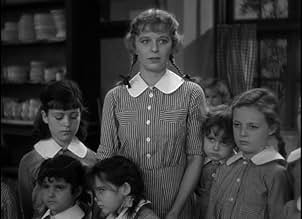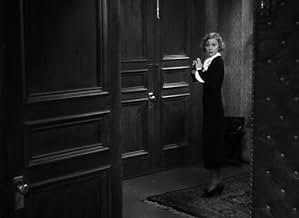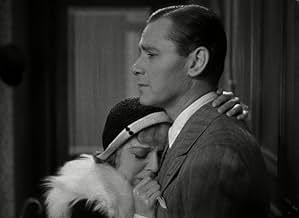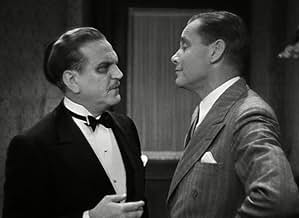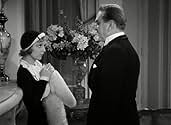PUNTUACIÓN EN IMDb
7,4/10
1,7 mil
TU PUNTUACIÓN
Una chica huérfana recién salida de un orfanato se da cuenta de lo mucho que complica la vida ser una "hada buena" para los desconocidos.Una chica huérfana recién salida de un orfanato se da cuenta de lo mucho que complica la vida ser una "hada buena" para los desconocidos.Una chica huérfana recién salida de un orfanato se da cuenta de lo mucho que complica la vida ser una "hada buena" para los desconocidos.
- Dirección
- Guión
- Reparto principal
- Premios
- 2 premios en total
Ted Billings
- Shoeshine Man
- (sin acreditar)
Alene Carroll
- Schoolgirl in Orphanage
- (sin acreditar)
Reseñas destacadas
A very fine director (William Wyler), an excellent cast, and prestigious source material (a play by Ferenc Molnar), but this delightful screwball comedy has screenwriter Preston Sturges' fingerprints all over it, and Wyler's casual, unfussy direction feels like Sturges' when directing his own later masterpieces. Margaret Sullavan is the well-meaning orphan set out into the world who wants to do good deeds, and one such deed spirals out of control and brings dizzying repercussions. What Sturges does, as he often did, is set up an absurd situation and keep juggling, each ball just about to come crashing down but never quite hitting the floor. He invents funny lines for expert supporting farceurs and keeps the tempers high, and sends the dialog careening down unexpected alleyways. The contemporary Times critic didn't think Sullavan was a natural comedienne, but I beg to differ, and her whimsical quality is just right. Herbert Marshall, often annoying, is charming here, and Frank Morgan gets perhaps his best shot ever at a character he practically patented--the dithering dilettante, all false bravado and doubling-back-on-himself retractions. Its inconsequentiality is part of its appeal, and if you think it feels like a musical, you're not far off: Sturges later adapted his own screenplay as a Broadway vehicle for Nanette Fabray (good casting), but he botched the adaptation, and "Make a Wish" was an expensive flop. This one doesn't turn up too often, so catch it when you can, and revel in the early Sturges finding and perfecting his unique voice.
This sparkling comedy may well deserve the title of Best Kept Secret of the '30s: it's a delight in every department, yet somehow remains all but unknown, even among film buffs. Based on a play by Ferenc Molnár, The Good Fairy is funny and warm, full of richly detailed, eccentric characters brought to life by an ensemble of terrific character actors. The direction, scenic design, and cinematography are all first-rate products of the Hollywood studio system in its prime, but despite the uniformly high level of craftsmanship on display I believe most of the credit for this gem rightfully belongs to Preston Sturges, for his witty screenplay. Sturges was compelled to make changes in Molnár's story in order to accommodate the standards of the newly powerful Hays Office, but in so doing he managed to create an adaptation with a special daffy charm all its own, one that deserves a place alongside his more characteristic masterworks of the '40s. Considering the increased interest in Sturges' work in recent years, and the vast elevation of his standing in the Hollywood Pantheon, it's all the more surprising that this film remains so obscure.
Molnár's play tells the story of an amoral young woman named Lu, a theater "usherette" loved by a handsome but poor waiter. Lu would prefer to get ahead in the world by taking advantage of her rich (and married) admirer Konrad. Lu considers sleeping with Konrad, but because she finds him unattractive puts him off by claiming that she's already married, to a lawyer. When Konrad insists on helping her husband professionally -- in hopes of bedding Lu as a reward -- she picks a name out of the phone book at random: Max Sporum. From there things get complicated, but it's interesting to note that in Molnár's play the sexually sophisticated Lu acts only as matchmaker (thus, "good fairy") to the three men in her life, successfully pairing off each one with another woman while remaining single herself. Sturges retained this basic framework but made his Luisa (Margaret Sullavan) far more innocent: she's fresh from an orphan asylum, and totally unschooled in the ways of the world, particularly where men are concerned. In Sturges' version Detlaff the waiter (Reginald Owen) is an older man who is protective of Luisa in a fatherly way but not romantically interested, while the rich middle-aged businessman Konrad (Frank Morgan) initially seems to be a horny roué, but turns out to be an old softy. And where Molnár's Max Sporum was a homely man already involved with his secretary, the lawyer in this film is played by debonair Herbert Marshall, the secretary has been eliminated, and eventual romance between Luisa and Max is assured.
How much of this plotting was imposed on Sturges by the demands of the censors is irrelevant, ultimately, because he succeeded in imposing his own raffish sensibility onto the material despite the unlikely elements, such as Luisa's almost otherworldly innocence and the entirely benevolent interest shown in her by all of these older men. The Hays Office was never much of an impediment to Sturges, anyhow; besides, he slipped a couple of surprisingly risqué lines past the censors here, as he would elsewhere. The plot of this movie depends heavily on Luisa's childlike qualities, and probably wouldn't work nearly as well if she were more sophisticated. If The Good Fairy had been made a few years earlier in the "Pre-Code" era it surely would have been spicier, but might have lost something, too. As it stands, the film strikes just the right balance between sauciness and sweetness, without too much of either element.
Sturges' script is brought to life on screen by a cast of exceptional actors. Margaret Sullavan is quite perfect as Luisa, obviously smart but also stunted by her upbringing. Sullavan conveys the character's innocence without coming off as an idiot, which is no easy trick. Frank Morgan is delightful as Konrad, the wealthy businessman whose interest in Luisa sets the story in motion and changes everyone's life. (Coincidentally, Morgan, who is best remembered for his performance in the title role as The Wizard of Oz a few years later, compares himself to a wizard at one point in a conversation with Luisa.) Herbert Marshall gives perhaps the best comic performance of his career in the unlikely role of impoverished lawyer Max Sporum, a man so delighted by his improved status in life that he waxes eloquent on the subject of a new pencil sharpener. Marshall is a charming actor who deserves to be better remembered; he had one of the best voices of his day, along with Ronald Colman and George Sanders. Reginald Owen is at something of a disadvantage, as his character of Detlaff is rather one-dimensional, but he gives it all he's got and grows on you by the end. The supporting cast is full of the colorful players who used to populate these movies in Hollywood's Golden Age (Alan Hale, Beulah Bondi, Eric Blore, etc.) and who make their limited screen time count.
I've seen The Good Fairy three times now, and enjoy it more with each viewing. I'm still catching funny lines that flew past while I was laughing at something else, and how often can you say that about any comedy? Oh, and don't miss the comic high point, a movie-within-a- movie parody that's as funny as anything Sturges ever wrote.
Molnár's play tells the story of an amoral young woman named Lu, a theater "usherette" loved by a handsome but poor waiter. Lu would prefer to get ahead in the world by taking advantage of her rich (and married) admirer Konrad. Lu considers sleeping with Konrad, but because she finds him unattractive puts him off by claiming that she's already married, to a lawyer. When Konrad insists on helping her husband professionally -- in hopes of bedding Lu as a reward -- she picks a name out of the phone book at random: Max Sporum. From there things get complicated, but it's interesting to note that in Molnár's play the sexually sophisticated Lu acts only as matchmaker (thus, "good fairy") to the three men in her life, successfully pairing off each one with another woman while remaining single herself. Sturges retained this basic framework but made his Luisa (Margaret Sullavan) far more innocent: she's fresh from an orphan asylum, and totally unschooled in the ways of the world, particularly where men are concerned. In Sturges' version Detlaff the waiter (Reginald Owen) is an older man who is protective of Luisa in a fatherly way but not romantically interested, while the rich middle-aged businessman Konrad (Frank Morgan) initially seems to be a horny roué, but turns out to be an old softy. And where Molnár's Max Sporum was a homely man already involved with his secretary, the lawyer in this film is played by debonair Herbert Marshall, the secretary has been eliminated, and eventual romance between Luisa and Max is assured.
How much of this plotting was imposed on Sturges by the demands of the censors is irrelevant, ultimately, because he succeeded in imposing his own raffish sensibility onto the material despite the unlikely elements, such as Luisa's almost otherworldly innocence and the entirely benevolent interest shown in her by all of these older men. The Hays Office was never much of an impediment to Sturges, anyhow; besides, he slipped a couple of surprisingly risqué lines past the censors here, as he would elsewhere. The plot of this movie depends heavily on Luisa's childlike qualities, and probably wouldn't work nearly as well if she were more sophisticated. If The Good Fairy had been made a few years earlier in the "Pre-Code" era it surely would have been spicier, but might have lost something, too. As it stands, the film strikes just the right balance between sauciness and sweetness, without too much of either element.
Sturges' script is brought to life on screen by a cast of exceptional actors. Margaret Sullavan is quite perfect as Luisa, obviously smart but also stunted by her upbringing. Sullavan conveys the character's innocence without coming off as an idiot, which is no easy trick. Frank Morgan is delightful as Konrad, the wealthy businessman whose interest in Luisa sets the story in motion and changes everyone's life. (Coincidentally, Morgan, who is best remembered for his performance in the title role as The Wizard of Oz a few years later, compares himself to a wizard at one point in a conversation with Luisa.) Herbert Marshall gives perhaps the best comic performance of his career in the unlikely role of impoverished lawyer Max Sporum, a man so delighted by his improved status in life that he waxes eloquent on the subject of a new pencil sharpener. Marshall is a charming actor who deserves to be better remembered; he had one of the best voices of his day, along with Ronald Colman and George Sanders. Reginald Owen is at something of a disadvantage, as his character of Detlaff is rather one-dimensional, but he gives it all he's got and grows on you by the end. The supporting cast is full of the colorful players who used to populate these movies in Hollywood's Golden Age (Alan Hale, Beulah Bondi, Eric Blore, etc.) and who make their limited screen time count.
I've seen The Good Fairy three times now, and enjoy it more with each viewing. I'm still catching funny lines that flew past while I was laughing at something else, and how often can you say that about any comedy? Oh, and don't miss the comic high point, a movie-within-a- movie parody that's as funny as anything Sturges ever wrote.
Circumstances afford a young woman an opportunity to enrich the life of a poor person that she picks randomly out of a telephone book. Sturges delightfully adapts a Hungarian play, incorporating the kind of snappy dialog that would mark his later directorial efforts. In one of three great films he directed in the mid 1930s (Counsellor at Law, Dodsworth), Wyler displays a touch comparable to Lubitsch. Sullavan, an actress whose career and life were both sadly short, is charming as a good-hearted orphan. Marshall is perfectly cast as a dignified lawyer. Laughs are provided by Owen as a waiter who wants to protect Sullavan and by Morgan as a tycoon who wants to be Sullavan's Sugar Daddy.
The story of a naif who goes out into the world, skirts calamity (i.e. seduction, in the guise of Frank Morgan, no less), and finds true love (Herbert Marshall, who likewise should be better remembered--he'd a been a bigger star if he would have been five years younger when the talkies started in earnest). Of course, Sullavan the naif is the one who instructs the world weary cosmopolitans rather than vice-versi.
The script, being by Preston Sturges, is funny and witty and artfully plotted. Sullavan was a great actress/star of the '30's early '40's who unfortunately is mostly forgotten now. She has a quality, a sly subtle acidity that makes her different from other screwball heroines. She also had the knack of bringing out the tenderness in her male leads (James Stewart was never more suave, articulate, and keenly perceptive than opposite the funny cruel little egomaniac Sullavan in The Shop Around the Corner, which is a masterpiece, and she brought out the early best in her former husband, Henry Fonda, in The Moon's Our Home, which is another forgotten little gem). It's not so much she's vicious a la Bette Davis or the divine Barbara Stanwyck: she's too minutely picky, petty really in getting what she wants, too self-centeredly rational in getting her way for that. But, anyway, The Good Fairy has a younger softer Sullavan. The supporting cast is superior, too.
The script, being by Preston Sturges, is funny and witty and artfully plotted. Sullavan was a great actress/star of the '30's early '40's who unfortunately is mostly forgotten now. She has a quality, a sly subtle acidity that makes her different from other screwball heroines. She also had the knack of bringing out the tenderness in her male leads (James Stewart was never more suave, articulate, and keenly perceptive than opposite the funny cruel little egomaniac Sullavan in The Shop Around the Corner, which is a masterpiece, and she brought out the early best in her former husband, Henry Fonda, in The Moon's Our Home, which is another forgotten little gem). It's not so much she's vicious a la Bette Davis or the divine Barbara Stanwyck: she's too minutely picky, petty really in getting what she wants, too self-centeredly rational in getting her way for that. But, anyway, The Good Fairy has a younger softer Sullavan. The supporting cast is superior, too.
I'm a fan of Preston Sturges, and I was brought to this movie by his screenplay credit, not knowing if that would be enough to make this a movie I was going to enjoy. GOOD NEWS! This movie is a real joy from start to finish.
From the outset the humour was quite subtle, and the sophisticated dialogue sounded very modern. Clearly, although this Sturges script isn't served by Sturges direction, this is still a Preston Sturges movie. And the script is backed up by sympathetic direction from William Wyler and the performances of the lead players. In particular Margaret Sullavan is fresh and funny as the fish-out-of-water naive young girl leaving her orphanage to join the outside world, determined to do a good deed every day... to be a Good Fairy to somebody.
Unfortunately the lies she feels she has to tell, and the resulting problems she's willing to face, lead her into digging a deeper and deeper hole for herself, and into dragging other characters into the hole with her. Those other characters are the Sturges eccentrics we know from his acclaimed movies of later years. The scenes with Frank Morgan and Reginald Owen shouting at each other with Sullavan between them are fabulous. Herbert Marshall is also good, but he or his character can not match the same level of lunacy.
Now I've seen this, I just hope it won't be long before I can get to see "Easy Living", the next comedy that Preston Sturges was able to write and exert the same level of influence over.
From the outset the humour was quite subtle, and the sophisticated dialogue sounded very modern. Clearly, although this Sturges script isn't served by Sturges direction, this is still a Preston Sturges movie. And the script is backed up by sympathetic direction from William Wyler and the performances of the lead players. In particular Margaret Sullavan is fresh and funny as the fish-out-of-water naive young girl leaving her orphanage to join the outside world, determined to do a good deed every day... to be a Good Fairy to somebody.
Unfortunately the lies she feels she has to tell, and the resulting problems she's willing to face, lead her into digging a deeper and deeper hole for herself, and into dragging other characters into the hole with her. Those other characters are the Sturges eccentrics we know from his acclaimed movies of later years. The scenes with Frank Morgan and Reginald Owen shouting at each other with Sullavan between them are fabulous. Herbert Marshall is also good, but he or his character can not match the same level of lunacy.
Now I've seen this, I just hope it won't be long before I can get to see "Easy Living", the next comedy that Preston Sturges was able to write and exert the same level of influence over.
¿Sabías que...?
- CuriosidadesMargaret Sullavan wanted control on the set of the movie, and did spiteful things to get her way. Script girl Freda Rosenblatt said: If she was tired and wanted to go home and Willy had one more scene to do, she would smear the makeup on her face. That would mean everything had to stop so she could be made up again. Which might take hours. So they couldn't shoot. Maggie got so bored between scenes she went behind one of the sets and purposely lay down on the dusty floor. The beautiful white dress she was wearing was a wreck. That stopped everything. -- Despite all this, she and Wyler fell in love and were married during the filming.
- ConexionesFeatured in WatchMojo: Top 10 Comedy Movies: 1930s (2014)
Selecciones populares
Inicia sesión para calificar y añadir a tu lista para recibir recomendaciones personalizadas
- How long is The Good Fairy?Con tecnología de Alexa
Detalles
Taquilla
- Recaudación en todo el mundo
- 7478 US$
- Duración1 hora 38 minutos
- Color
- Relación de aspecto
- 1.37 : 1
Contribuir a esta página
Sugerir un cambio o añadir el contenido que falta

Principal laguna de datos
By what name was Una chica angelical (1935) officially released in Canada in English?
Responde
